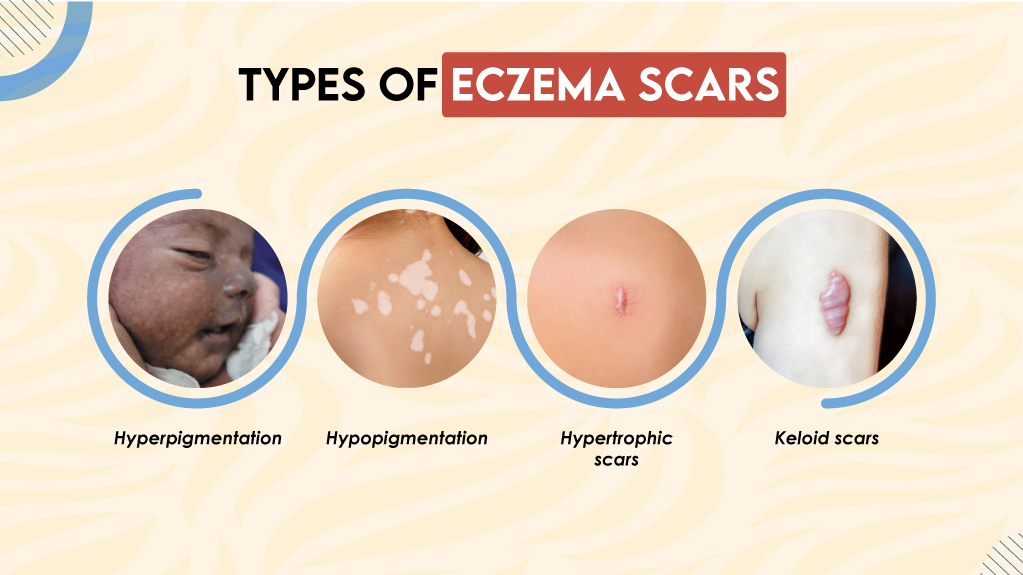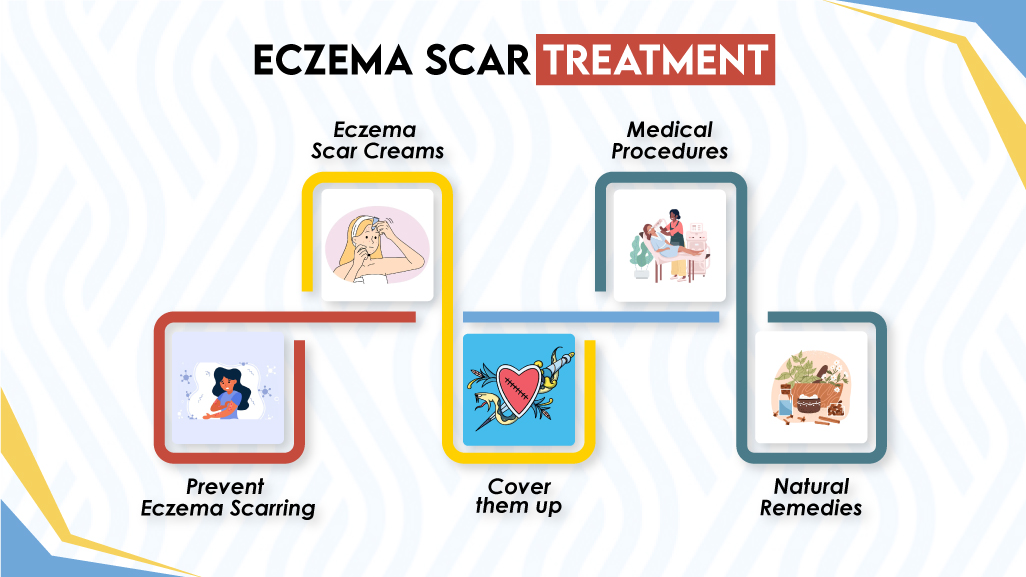
The first thing that most parents think of when they see those itchy, rough, dry, red rashes associated with eczema on their baby’s body is, “Does eczema leave scars?” The simple answer is no. It won’t leave a permanent scar.
However, some babies may experience temporary eczema scars. This is why we have written this blog to help you understand everything you should know about eczema scars.
What is a Scar?
Scars are basically your skin trying to heal itself and make it look normal. When the skin is damaged for any reason, such as injury, rash, or burns, it tries to repair itself by producing new tissues to fill the gap or wound.
These scars can be either temporary or permanent, leaving a mark to remind you of the time you fell off the swing and sliced open your elbow. Just like this, common skin conditions like eczema or atopic dermatitis can also leave temporary marks or scars on your skin.
Does Eczema Scar?
If you are wondering, will eczema leave scars? most of the time, it will not leave a scar. But depending on your skin color, you may be left with some discoloration known as postinflammatory hypopigmentation (skin lightening) or postinflammatory hyperpigmentation (skin darkening) after the acute flare resolves.
More extensive eczema scarring could occur due to excessive, long-term scratching on itch-prone skin. Untrimmed long nails can cause deep erosions on skin that have already been weakened by eczema.
What Do Eczema Scars Look Like?
Eczema marks can appear in different shapes and sizes and can look different depending on your skin tone. Skin color is determined by the production of melanin by the skin cells. The more melanin you have, the darker your skin color will be.
The color of your scar is also determined by the melanin. In most cases, the eczema scars are so minor that they blend in with the skin over time. However, they may appear different depending on your skin tone.
Eczema Scars on Lighter Skin Tones may appear as pinkish or reddish marks.
Eczema Scars on Darker Skin Tones may appear as brown, gray, pr purple.
Sometimes these can be darker than or lighter than the skin, making them more visible on the skin. It all depends on the type of scar you are experiencing. Here are some of the most common types.
Types of Eczema Scars

- Hypopigmentation
Light scarring or hypopigmentation tends to occur because after the skin is irritated, it produces less melanin. Melanin is what gives us our skin color.
Hypopigmentation is more evident in people with darker skin, as the lightened area will stand out more.
These scars are darker in color than the skin tone and are produced due to excess melanin. In addition to appearing after eczema flare-ups, they also occur in other situations that cause skin inflammation–like acne or insect bites.
- Hypertrophic scars
Sometimes eczema scars can appear a bit abnormal. Often, scars are flat, but the hypertrophic scars are raised above the skin. They usually take the shape and size of the original wound.
- Keloid scars
Keloid scars are also raised above the skin however these scars can spread beyond the size and shape of the original scar.
Also, when the affected area is exposed to sunlight, the skin that has functioning melanin surrounding the zone of eczema takes more color, and the lightening of the skin in the zone of eczema is more pronounced.
What Causes Eczema Scars?
The most common cause of your eczema scars is the change in skin pigmentation after you have experienced a flare-up. The inflammation, rashes, and irritation caused by eczema can damage the topmost layer of the skin, also known as the epidermis.
Due to the inflammation, the melanocytes, the cells that produce melanin, will either increase or decrease, which can lead to the development of the scars. Some other common causes of eczema scarring are
Scratching
Eczema can cause dry, itchy skin. The itching gets so intense at times especially during the night, that it becomes hard to resist scratching. And once you scratch, you start a never-ending itch-scratch cycle.
The more you scratch, the more it will itch. This scratching can cause trauma and damage to the skin, which can lead to pigment changes and scarring.
Use of Corticosteroids
Any medication should only be used as advised by a doctor, this is very essential if you are using corticosteroids for eczema treatment. Using these medications, creams, and ointments continuously for a long period can cause side effects like skin lightening, which can appear as scars on the skin.
Will Eczema Scars Go Away?
Now that you have discovered that eczema can cause scarring, most probably, the next question that might have come into your mind is, “will my eczema scars go away”?
Yes, Eczema scarring often fades on its own over time, depending on the extent of the scars.
As for scars that take too long to disappear or are too dark, it is possible to lighten them with the help of treatments like the use of scar creams and laser therapy or other clinical procedures.
How Long Do Eczema Scars Last?
The scars may feel like they take forever to go away, but they usually start to fade in 4 to 6 months if the itch-scratch cycle is stopped. Lighter scars may resolve within a few weeks or months. Darker scars, or the ones caused by scratching, may take longer.
However, there are various factors that determine how long your eczema scar will last, such as:
- If the affected area is exposed to sunlight without any protection, it may take more time to resolve.
- Severe eczema, especially the ones that become infected, can cause long-lasting scars.
- If proper care or treatment is not provided, the scar may take longer to disappear.
Eczema Scar Treatment

Even though there is no magic that will help you get rid of eczema scars overnight, there are some things that you can do to make them look lighter and less noticeable and help them heal fast.
Prevent Eczema Scarring
The best way to reduce scarring from eczema is to prevent it in the first place. Three effective preventative measures for eczema in babies, children, and adults include:
Skin Care
The proper eczema skincare routine can help soothe eczema symptoms and prevent future flare-ups.
Cleanse your baby’s skin with the help of fragrance-free baby eczema body wash daily. Make sure that you bathe them daily in lukewarm water for 10 minutes maximum. Then gently pat dry their skin with a soft towel.
Use a moisturizing cream for eczema after bath time to moisturize their skin and focus more on affected areas. Also, using it twice daily or throughout the day will also go a long way toward preventing eczema scarring and relieving symptoms.
If your eczema is not improving with the regular skincare mentioned above, you should see your health care provider. Prescription steroid creams or ointments and non-steroidal prescribed topical medications are essential to control an aggressive eczema flare.
Sunblock
Use a sunblock that is made for sensitive skin. Find a product that avoids irritants like parabens and has broad-spectrum UVA and UVB protection. Using sunblock daily will protect the skin and prevent surrounding unaffected skin from getting darker, thus reducing the contrast between affected and unaffected skin.
If your baby is under six months of age, consult their pediatrician first before using any sunblock.
Control the Itching
Scratching eczema rashes can cause scarring, irritation, and infection, so controlling your baby’s itching is vital. Keep your baby’s nails clipped short and prevent itching at night or naptime by placing cotton mittens on your baby’s hands.
You can also consult the doctor and perform wet wrap therapy if the itching becomes intense at night and disrupts your baby’s sleep.
Avoid Triggers
Triggers are environmental factors that can cause or worsen an eczema flare-up. Common triggers include extreme temperatures, restrictive clothing, irritating materials like wool or polyester, harsh products like soaps, scented laundry detergents or dryer sheets, and household cleaners.
Avoid using them to prevent eczema flare-ups. You can use fragrance-free, paraben-free, sulfate-free baby eczema products instead of the ones that contain harsh chemicals.
Treat Early
Treating your baby’s eczema as soon as you notice it is essential. Early treatment will reduce the risk of scarring in hyperpigmentation and hypopigmentation and significantly improve the quality of your little one’s life.
Eczema Scar Creams
Various over-the-counter and prescription scar creams and ointments are available that can be used and applied to the affected area to reduce the appearance of scars. Many scar creams contain hydrating ingredients like glycerin and hyaluronic acid that help lock in moisture and promote faster skin healing.
Some scar creams contain ingredients like vitamin C that may help in lighten eczema scars, post-inflammatory hyperpigmentation, and dark spots by triggering melanin production in the skin.
Cover Them Up
This is usually done when the scars do not disappear after a long period of time, usually after a year or two, and they are bothering you. You can use makeup to cover the marks and dark spots and make them look just like your skin color.
Some people also tattoo over eczema scars to change their appearance. However, ensure you don’t get the tattoo during a flare-up and that your scar is perfectly healed. This can only be done for adults and not babies.
Medical Procedures
Dermatologists and cosmetic surgeons also offer some medical procedures that can help remove or lighten your eczema scars. Some common procedures that can be done are micro-needling chemical peels and laser therapy.
Laser therapy is helpful for both hyper and hypopigmentation. However, these procedures can be painful and may need to be performed several times to get the desired results, and are only performed on adults.
Natural Remedies
The internet also claims that various natural remedies like aloe vera, bio-oil, and essential oils can help you remove the eczema scars. But always keep in mind that every skin is different and may react differently, so before using any natural remedy, it is best to consult a doctor.
Eczema Skincare Products

If your baby or you are suffering from eczema and are actively looking for skincare products suitable for eczema-prone sensitive skin, try Happy Cappy Products.
Our Moisturizing Eczema Cream soothes eczema symptoms and prevents further irritation. It is infused with natural ingredients like Licorice Root Extract and Apple Fruit extract, which help soothe redness and irritation.
Our Eczema Shampoo and Body Wash is specifically designed for sensitive young skin. These products are free from any skin-irritating chemicals such as fragrance, sulfate, paraben, phthalates, artificial dyes, and alcohol that will make your baby’s condition worse.
Conclusion
Eczema scars are the healing marks left on your skin after an eczema flare-up. These are either caused by pigmentation changes in the skin or excessive scratching. In both ways, the skin cells either start producing less or more melanin, which leads to the appearance of the scars.
The scars may appear differently depending on your skin tone. However, some common types of scars experienced after a flare-up are hypopigmentation(skin-lightening) and hyperpigmentation(skin-darkening) of skin.
The best way to treat eczema scars is by preventing them. You can do this by not scratching your skin and following a proper skincare routine: keeping your skin clean with a fragrance-free eczema body wash and moisturizing your skin with an eczema cream.
If you are bothered by the appearance of the scars, then you can consult a doctor and use scar creams or get some medical procedures like laser therapy, micro-needling, and chemical peels to get rid of eczema scars.
FAQs
Do eczema scars ever go away?
Most of the time, eczema scars caused by flare-ups will resolve over time. The skin lightening or darkening caused by eczema is usually temporary and start getting better once the inflammation is reduced.
Can eczema permanently damage skin?
If you have been experiencing eczema flare-ups for years and your skin has been excessively scratched, it can damage the topmost layer of the skin permanently, leading to thickened, patchy skin.
Does skin go back to normal after eczema?
After experiencing a flare-up, the skin may not go back to its normal appearance. You may experience post-inflammatory hyperpigmentation or hypopigmentation for some time.
This skin discoloration may get better after months and years with proper care and treatment.
Is eczema hyperpigmentation permanent?
The hyperpigmentation scars or marks caused by eczema are usually temporary and can get better with time. However they may take months and years to disappear fully. It can take up to 5 years or more to resolve.
What helps heal eczema fast?
The best way to heal and relieve eczema symptoms is by following a proper skincare routine. Keep your skin clean by bathing daily with an eczema shampoo and body wash. And make sure to keep your skin moisturized at least twice daily with a moisturizng cream for eczema.
